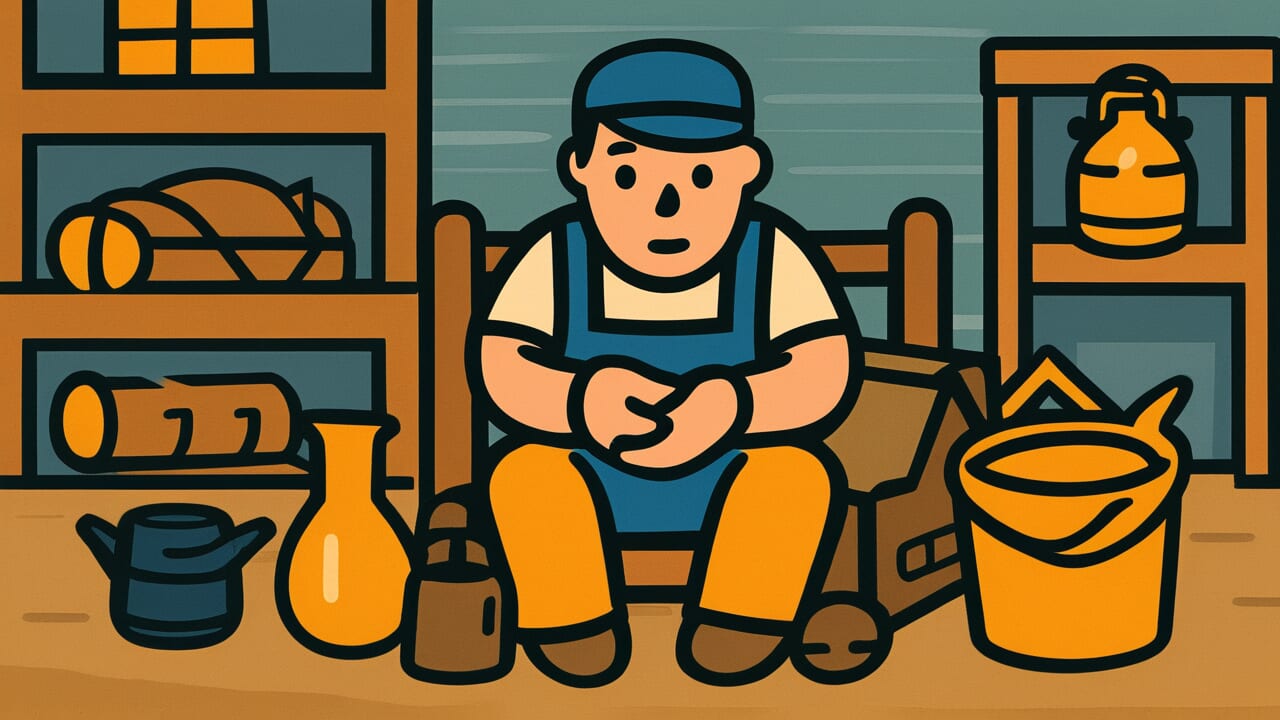How to Read “A craftsman is poor but rich in treasures”
Shokunin binbō hito takara
Meaning of “A craftsman is poor but rich in treasures”
“A craftsman is poor but rich in treasures” is a proverb that expresses an ironic reality. The more skilled and talented someone is, the less likely they are to become financially wealthy.
It points out a contradiction. Skilled technicians and specialists are precious to society—they are “treasures to people.” Yet these same individuals often remain poor.
This proverb is used when explaining situations where highly skilled people aren’t properly valued. Their talents don’t translate into fair economic rewards.
It describes perfectionists who won’t compromise on their craft. It applies to people who prioritize technical excellence over business success. These individuals often end up in difficult financial situations.
Even today, we see this pattern among researchers, artists, and engineers. Many highly specialized professionals fit this description.
The proverb reflects an unfair aspect of society. Ability and income don’t always match up.
Origin and Etymology
There’s no clear record of when this proverb first appeared in written form. However, the language suggests it reflects the craftsman culture of the Edo period.
“A craftsman is poor but rich in treasures” combines seemingly contradictory words. How can someone be both poor and a treasure? This paradoxical structure is intentional.
During the Edo period, skilled craftsmen were highly respected by society. Their techniques were called “treasures to people.” But in reality, many craftsmen weren’t financially well-off.
This situation arose from a unique value system called “craftsman spirit.” Craftsmen valued technical improvement and work quality over money. They often worked without regard for profit.
They spent time training apprentices. They insisted on using the best materials. These choices left little profit in their hands.
Compared to business-savvy merchants, craftsmen were poor at negotiating prices and promoting themselves. They lacked marketing skills.
People who observed this contradictory situation likely created this proverb. It captures the craftsman’s reality in a simple phrase.
Usage Examples
- That ceramic artist is highly praised both domestically and internationally, but it’s truly “a craftsman is poor but rich in treasures”—his workshop management is apparently in financial trouble
- He’s top-class in technical ability in the industry but weak at sales, living a life that perfectly embodies “a craftsman is poor but rich in treasures”
Universal Wisdom
“A craftsman is poor but rich in treasures” sharply points out a universal contradiction. It reveals the gap between value and reward in human society.
Why aren’t highly skilled people financially rewarded? Because creating truly valuable things and achieving economic success require completely different abilities.
People who pursue technical mastery spend too much time and money chasing perfection. Their refusal to compromise produces wonderful work. But from an efficiency and profit perspective, it’s irrational.
People absorbed in their craft are often bad at self-promotion and price negotiation. Passion for technique and business talent frequently oppose each other.
The proverb reveals a deeper truth. Society fails to properly value what’s truly valuable. People praise craftsmen’s skills but won’t pay accordingly.
We prioritize convenience and cheapness. We lose sight of true value. This reveals a fundamental human tendency.
This proverb has been passed down through generations for a reason. In every era, people have suffered from the mismatch between talent and reward.
It’s a structural problem in human society. It’s a deep contradiction that can’t be easily solved.
When AI Hears This
A craftsman’s skill is a “low entropy state” in physics terms. Entropy measures disorder. A messy room has high entropy. An organized room has low entropy.
A craftsman’s technique is highly ordered neural circuits and muscle movements. These are built through thousands of practice sessions. The craftsman maintains an extremely low entropy state within their body.
But the second law of thermodynamics says everything tends toward disorder when left alone. Rooms get messy by themselves but never clean themselves up.
Craftsman skills work the same way. Without daily practice, they definitely deteriorate. Maintaining this order requires constant energy input.
A top sushi chef practices for hours every morning to maintain fingertip sensitivity. This time and energy doesn’t directly generate money.
What’s more interesting is that maintenance costs increase exponentially as skills become more advanced. Maintaining beginner to intermediate levels is relatively easy. But preserving master-level skills requires enormous time investment.
In physics, maintaining lower entropy states requires greater energy input. Craftsmen sacrifice money-earning time to protect the order called skill.
This is a rare example where physical laws determine economic conditions.
Lessons for Today
This proverb teaches us a reality. Talent and expertise alone don’t guarantee economic success. Technical skill and management ability, specialization and versatility, perfectionism and efficiency—these often conflict with each other.
The proverb suggests the importance of finding balance.
This lesson is especially urgent for freelancers and specialized professionals. You need to polish your technical skills and knowledge. But you also need other abilities equally.
You must price your work appropriately. You must communicate it effectively. You must make it work as a business. Craftsman spirit is a virtue, but you can’t live on that alone.
At the same time, this proverb questions society as a whole. Do we truly value what’s genuinely valuable? Are we pursuing only cheapness and convenience while ignoring real skill and quality?
Creating a society where excellent technicians are rewarded is everyone’s responsibility. People with skills need business sense. Society needs eyes to recognize true value.
Only when both come together can this contradiction be resolved.



Comments